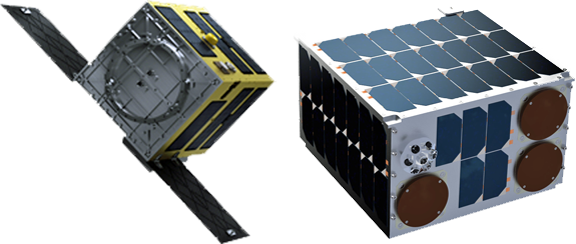
ASTROSCALE PTE. LTD. (ASTROSCALE) and Surrey Satellite Technology Ltd (SSTL, part of the Airbus Group) have signed a Memorandum of Understanding (MoU) to pursue joint opportunities in areas of innovative on orbit technologies and missions designed to safeguard the orbital environment for future generations.
ASTROSCALE and SSTL have agreed to long-term strategic cooperation that further positions the companies to compete globally in the growing smallsat and orbital debris removal markets. Together, the companies will seek to identify ambitious debris removal projects and joint offerings for competitive smallsat missions in Japan.

Artistic renditions of...
Left — the ELSA-d chaser satellite.
Right — the ELSA-d target satellite.
Images are courtesy of ASTROSCALE and SSTL.
As a first step, ASTROSCALE has contracted SSTL to supply a “Target” satellite and avionics for the firm's inaugural End-of-Life Service by ASTROSCALE — demonstration (ELSA-d) mission, which will simulate capture of orbital debris and is designed to validate key technologies for end-of-life spacecraft retrieval and disposal services.
ASTROSCALE hopes to establish a long-term presence in the UK, starting with the establishment earlier this year of an office and mission control center in Harwell. This cooperation will lead to further investment in the UK, including potential establishment of a supply chain.
The ELSA-d mission will be comprised of a “Chaser” satellite and the Target satellite and will demonstrate key technologies necessary for orbital debris removal, such as rendezvous and docking and proximity operations. ASTROSCALE will design and manufacture the Chaser at their R&D office in Tokyo, using avionics from SSTL. The satellite will be equipped with optical sensing instruments and a redundant capture mechanism.
The small satellite remote sensing and orbital debris removal markets are predicted to grow significantly in the coming years. By agreeing to long-term strategic cooperation, ASTROSCALE and SSTL are now positioned to take advantage of these opportunities and positively impact future generations.
The Target and the Chaser will be attached for launch and de-orbit, but while on orbit, will be deployed in a series of three increasingly complex separation and capture maneuvers using rendezvous and docking algorithms. A docking plate with optical marker s will be attached to the Target, allowing the Chaser to identify and estimate attitude during the docking.
Nobu Okada, Founder and CEO of ASTROSCALE, stated that SSTL is synonymous with reliable and cost-effective small satellites and we are thrilled that they will provide a key component to ELSA-d.We are confident that this is only the beginning of mutually beneficial long-term relationship.
Sir Martin Sweeting, the Executive Chairman of SSTL, added that the company is extremely pleased to be working with ASTROSCALE, a like-minded, innovation-driven company seeking to make space business viable for commercial operators. This practical solution to debris mitigation has the potential to provide a cost-effective approach for ensuring the long-term sustainability of the space environment for all.
SSTL’s Target satellite incorporates S-band communications, GPS positioning, a 3-axis control system and laser retro-reflector. A variant of the SSTL-42 constellation platform family designed for operational missions in the 5 to 100 kg range, the satellite will also fly an HD camera and lighting to record the capture sequences during eclipse.
The SSTL-42 range is well suited to initial demonstration missions, with platforms and technology that can be subsequently scaled up, all the while retaining key technology and flight software developments and mass produced for more sophisticated missions and constellations.
SSTL has also supplied the platform for RemoveDEBRIS, a technology demonstration mission to test debris mitigation technologies and which is due to launch from the ISS in 2018.
SSTL has, to date, launched 50 satellite missions and the ASTROSCALE smallsat will be the company’s 67th mission under contract. Previous missions have included Beijing-1, the 5 satellite RapidEye constellation, Deimo -1, exactView-1, KazEOSAT-2, and the 3-satellite TripleSat constellation.

